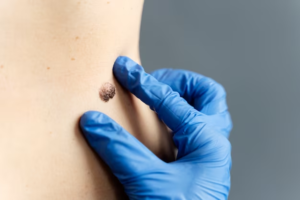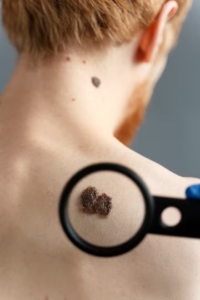Skin cancer is a type of cancer that forms in the skin cells. It is the most common type of cancer in Australia. There are several types of skin cancer, but the three most common are basal cell carcinoma, squamous cell carcinoma, and melanoma.
Appearance: Often appears as a pearly or waxy bump, or a flat, flesh-colored or brown scar-like lesion.
Location: Typically found on sun-exposed areas like the face and neck.
Growth: Slow-growing and rarely spreads to other parts of the body.
Appearance: Often appears as a red nodule, a scaly patch, or a sore that heals and then reopens.
Location: Commonly found on the face, ears, neck, hands, and arms.
Growth: May grow more rapidly than basal cell carcinoma, and there is a higher risk of spreading.
Appearance: Often characterized by the development of a new mole or a change in an existing mole. The ABCDE rule is a helpful guide:
A for Asymmetry: One half of the mole does not match the other.
B for Border irregularity: The edges are irregular, notched, or blurred.
C for Color changes: The color is not uniform and may include shades of brown or black, and sometimes red, white, or blue.
D for Diameter: The size of the mole is larger than 6 millimetres.
E for Evolution: The mole changes in size, shape, or color over time.
It's essential to regularly check your skin for any changes and consult a healthcare professional if you notice any suspicious lesions or experience symptoms associated with skin cancer. Early detection and treatment significantly improve the chances of successful outcomes. Book Your Skin Cancer Screening Appointment today!
The treatment of skin cancer depends on the type and stage of the cancer, as well as the patient's overall health. Common treatments include:
It's crucial for individuals diagnosed with skin cancer to discuss treatment options with their healthcare team. Additionally, preventive measures such as sun protection (using sunscreen, wearing protective clothing, avoiding peak sun hours) can help reduce the risk of developing skin cancer.
Two in three Australians will be diagnosed with skin cancer at some point in their life. Skin cancer is the most common type of cancer in Australia.
We at Chermside provide full-body skin cancer consultations with experienced General Practitioners at our clinics. Dr Lee Ong is an Oncoplastic breast surgeon. He diagnoses and performs surgery to remove breast cancer. Dr Lee Ong has more than 15 years of experience as a General Surgeon.
General Surgeon & Skin Cancer Specialist
At Chermside Specialist, we offer research-based clinical treatments, innovative surgeries and preventive screenings. Early detection and treatment often lead to successful outcomes, so regular skin examinations and prompt medical attention for any suspicious changes are essential. Chermside Specialist also has access to private hospitals in North Brisbane and offers a short waiting list.
Book your appointment to know your risk for skin cancer today.


If you have any questions or concerns, Please talk to us at Chermside Specialists (22 Corrie St
Chermside QLD 4032) on 07 3505 6425 to find out more.
Various Specialists Under One Roof. We are a specialist centre offering a comprehensive range of adult and paediatric health care services. We ensure our patients and families have access to high quality treatment.